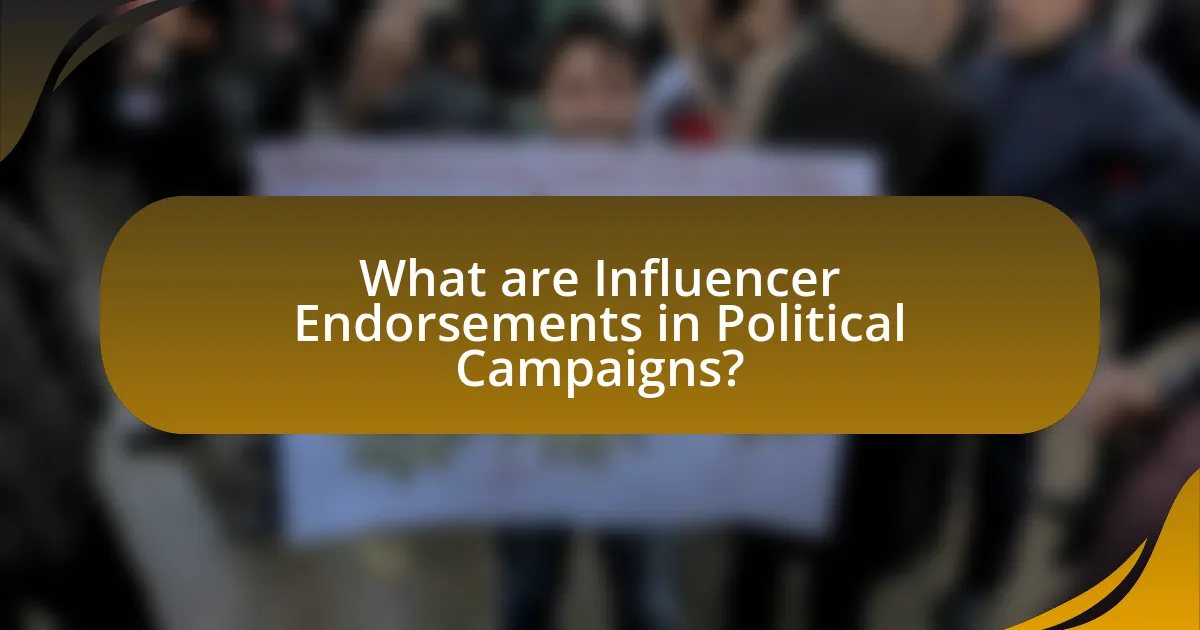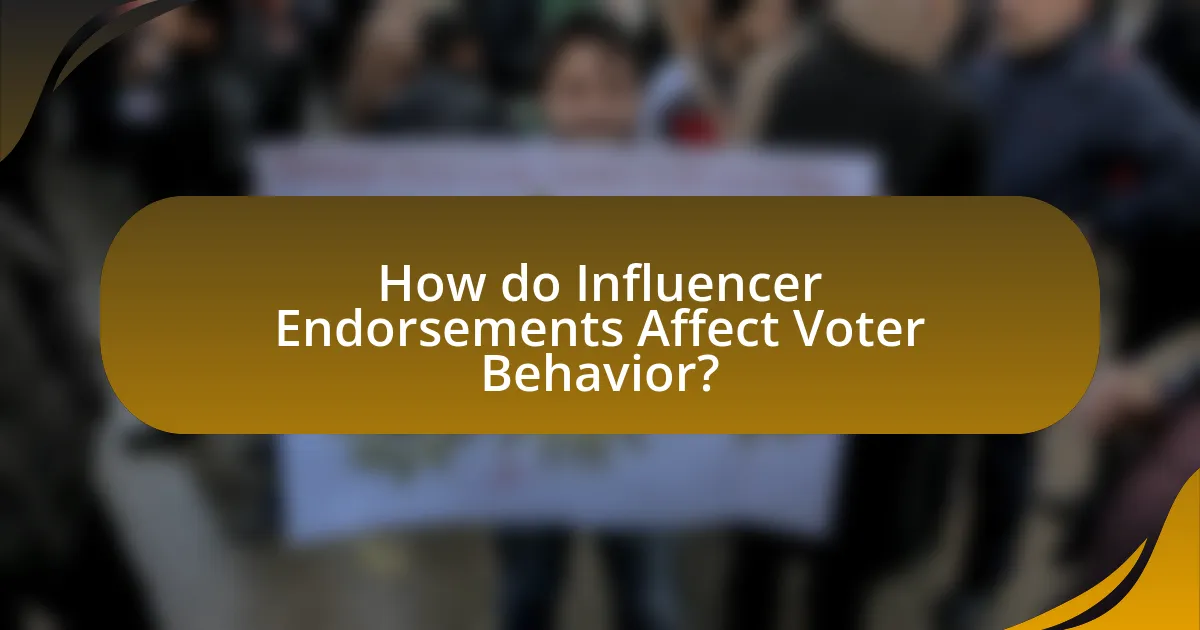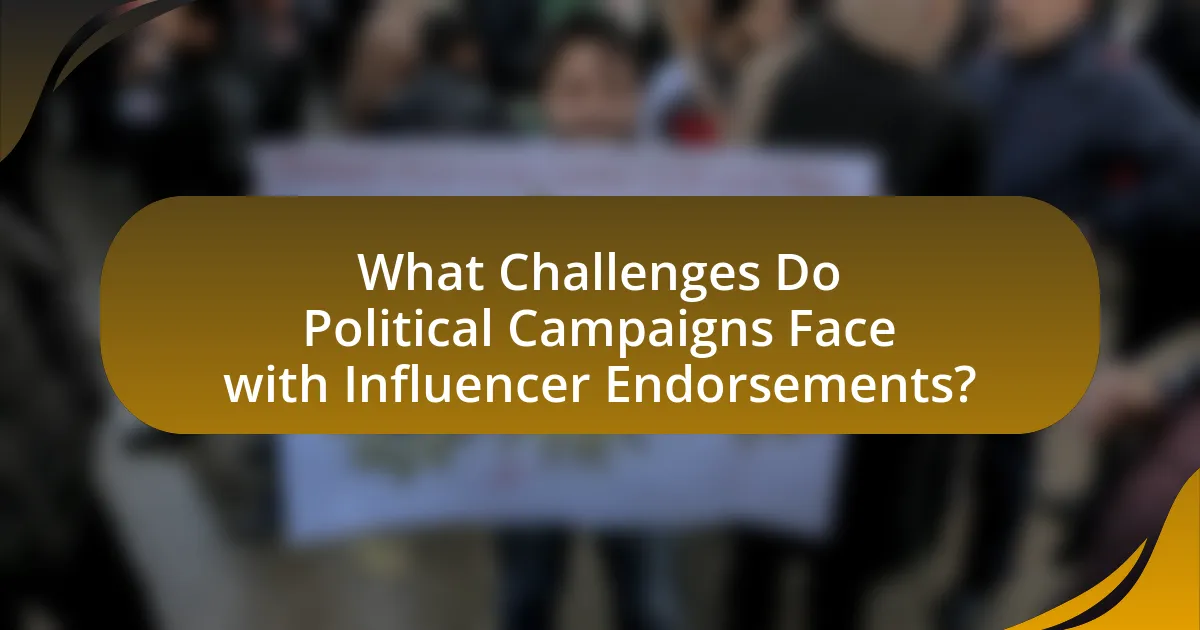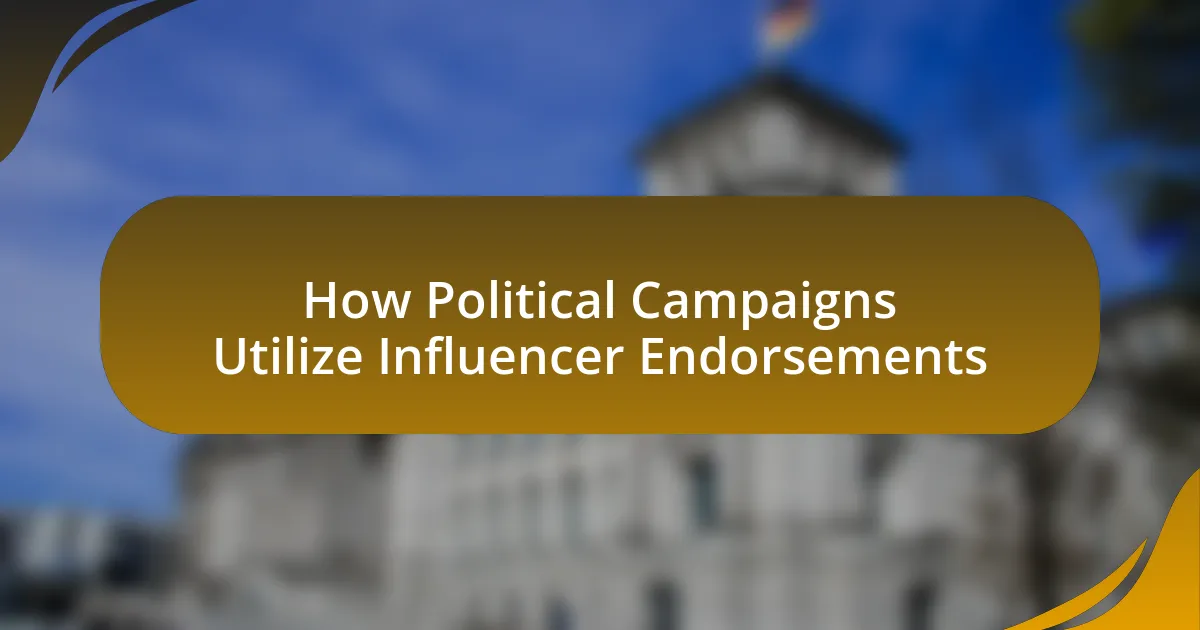Influencer endorsements in political campaigns refer to partnerships where individuals with substantial social media followings promote candidates or political messages, significantly impacting voter engagement, especially among younger demographics. The article explores how political campaigns define these endorsements, the types of influencers commonly used, and the differences between influencers and traditional endorsers. It also examines the importance of these endorsements in enhancing credibility and voter mobilization, the psychological factors that make them effective, and the challenges campaigns face, including credibility issues and potential backlash. Additionally, the article discusses strategies for leveraging influencer endorsements, measuring their effectiveness, and best practices for ensuring authenticity in these partnerships.

What are Influencer Endorsements in Political Campaigns?
Influencer endorsements in political campaigns are partnerships where individuals with significant social media followings promote a candidate or political message. These endorsements leverage the influencer’s reach and credibility to engage and mobilize voters, particularly younger demographics who may be more influenced by social media figures than traditional political advertisements. For instance, during the 2020 U.S. presidential election, influencers like Cardi B and Dwayne “The Rock” Johnson endorsed candidates, significantly impacting voter engagement and turnout among their followers.
How do political campaigns define influencer endorsements?
Political campaigns define influencer endorsements as strategic partnerships where individuals with significant social media followings promote a candidate or cause to their audience. These endorsements leverage the influencer’s credibility and reach to enhance the campaign’s visibility and engagement, often resulting in increased voter awareness and support. For instance, a study by the Pew Research Center indicates that 72% of adults use social media, making it a vital platform for political messaging.
What types of influencers are commonly endorsed in political campaigns?
Political campaigns commonly endorse three types of influencers: celebrities, social media influencers, and community leaders. Celebrities, such as actors and musicians, leverage their broad appeal to attract attention and sway public opinion. Social media influencers, who have substantial followings on platforms like Instagram and TikTok, engage younger demographics effectively, as seen in campaigns that utilize viral content to spread messages. Community leaders, including local activists and public figures, resonate with specific voter bases, providing authenticity and trust. These endorsements are strategically chosen to maximize reach and impact, as evidenced by the significant engagement rates and voter mobilization efforts observed in recent elections.
How do influencers differ from traditional endorsers in politics?
Influencers differ from traditional endorsers in politics primarily through their direct engagement with audiences on social media platforms. Influencers leverage their personal brands and authentic connections with followers to create a sense of relatability and trust, which can lead to higher engagement rates compared to traditional endorsers, who often rely on established reputations and formal advertising methods. For instance, a study by the Pew Research Center found that 72% of teens trust influencers more than celebrities, indicating that influencers can effectively sway public opinion and mobilize younger voters in ways traditional endorsers may not.
Why are influencer endorsements important in political campaigns?
Influencer endorsements are important in political campaigns because they enhance credibility and reach among target demographics. Influencers often have established trust with their followers, which can translate into increased voter engagement and support for a candidate. For instance, a study by the Pew Research Center found that 70% of young voters are influenced by social media personalities when making political decisions. This demonstrates that endorsements from influencers can significantly sway public opinion and mobilize voter turnout, making them a strategic asset in modern political campaigning.
What impact do influencer endorsements have on voter engagement?
Influencer endorsements significantly enhance voter engagement by leveraging the influencers’ established trust and reach within specific demographics. Research indicates that campaigns utilizing influencer endorsements can increase voter turnout by up to 20%, particularly among younger voters who are more likely to engage with content shared by influencers they follow. For instance, a study by the Pew Research Center found that 71% of young adults are influenced by social media personalities when making decisions, including political ones. This demonstrates that influencer endorsements can effectively mobilize and inform voters, ultimately impacting electoral participation.
How do endorsements influence public perception of candidates?
Endorsements significantly influence public perception of candidates by enhancing their credibility and visibility. When a respected figure endorses a candidate, it can lead to increased trust among voters, as endorsements often signal approval and validation of the candidate’s qualifications and policies. For instance, a study by the Pew Research Center found that 70% of voters consider endorsements from trusted individuals or organizations as a key factor in their decision-making process during elections. This demonstrates that endorsements can sway public opinion and potentially increase a candidate’s support base.
What strategies do political campaigns use to leverage influencer endorsements?
Political campaigns leverage influencer endorsements through targeted outreach, strategic partnerships, and content co-creation. Targeted outreach involves identifying influencers whose audiences align with the campaign’s demographic, ensuring that endorsements reach potential voters effectively. Strategic partnerships often include formal agreements where influencers promote the candidate’s message across their platforms, enhancing credibility and visibility. Content co-creation allows influencers to develop authentic narratives around the candidate, fostering a genuine connection with their followers. For instance, a study by the Pew Research Center found that 70% of young voters trust influencers more than traditional media, highlighting the effectiveness of these strategies in engaging key demographics.
How do campaigns select the right influencers for their message?
Campaigns select the right influencers for their message by analyzing audience alignment, engagement metrics, and the influencer’s credibility. They assess whether the influencer’s followers match the campaign’s target demographic, ensuring that the message reaches the intended audience effectively. Engagement metrics, such as likes, shares, and comments, provide insight into the influencer’s ability to connect with their audience, which is crucial for message amplification. Additionally, the influencer’s credibility and past endorsements are evaluated to ensure authenticity and trustworthiness, as studies show that campaigns with credible influencers yield higher engagement rates and positive sentiment.
What platforms are most effective for influencer endorsements in politics?
Social media platforms, particularly Instagram, Twitter, and TikTok, are the most effective for influencer endorsements in politics. These platforms have high engagement rates and allow influencers to reach diverse audiences quickly. For instance, a study by the Pew Research Center indicates that 69% of adults in the U.S. use Facebook, while Instagram and Twitter are popular among younger demographics, making them ideal for targeting specific voter groups. Additionally, TikTok’s rapid growth and viral content potential enable political messages to spread quickly, enhancing visibility and impact.

How do Influencer Endorsements Affect Voter Behavior?
Influencer endorsements significantly affect voter behavior by increasing engagement and shaping perceptions of candidates. Research indicates that endorsements from influencers can enhance a candidate’s credibility and relatability, leading to higher voter turnout among their followers. For instance, a study by the Pew Research Center found that 70% of young voters are influenced by social media personalities when making political decisions. This demonstrates that influencers can sway opinions and mobilize their audience, ultimately impacting election outcomes.
What psychological factors make influencer endorsements effective?
Influencer endorsements are effective due to several psychological factors, including social proof, trust, and relatability. Social proof occurs when individuals look to others for guidance on behavior, leading them to follow influencers who align with their values. Trust is established through perceived authenticity; influencers who share personal experiences create a bond with their audience, making their endorsements more credible. Relatability enhances this connection, as audiences are more likely to engage with influencers who reflect their own lifestyles and challenges. Research indicates that 70% of teenagers trust influencers more than traditional celebrities, highlighting the significant impact of these psychological factors on consumer behavior.
How does social proof play a role in voter decision-making?
Social proof significantly influences voter decision-making by creating a perception of consensus among peers regarding a candidate or issue. When individuals observe others supporting a particular candidate, they are more likely to align their own choices with that perceived majority, as demonstrated in studies showing that voters are swayed by endorsements from trusted figures or groups within their social circles. For instance, research published in the Journal of Politics indicates that voters are more likely to support candidates endorsed by influential community members, as these endorsements serve as a heuristic for decision-making, reducing the perceived risk associated with their choice.
What role does trust in influencers have on voter behavior?
Trust in influencers significantly impacts voter behavior by enhancing the credibility of political messages. When voters perceive influencers as trustworthy, they are more likely to accept and act upon the political endorsements and messages conveyed by these figures. Research indicates that 70% of millennials trust influencers more than traditional celebrities, which suggests that influencer endorsements can sway voter opinions and increase engagement in political campaigns. This trust fosters a sense of relatability and authenticity, making voters more receptive to the political narratives presented by influencers.
How do demographics influence the effectiveness of endorsements?
Demographics significantly influence the effectiveness of endorsements by determining the target audience’s receptiveness to specific influencers. For instance, younger demographics tend to respond more positively to endorsements from social media influencers, as evidenced by a study from the Pew Research Center, which found that 72% of teens engage with influencers on platforms like Instagram and TikTok. In contrast, older demographics may prefer endorsements from traditional celebrities or public figures, as they often associate these individuals with credibility and trustworthiness. This variance in response is further supported by research from Nielsen, which indicates that 92% of consumers trust recommendations from individuals over brands, highlighting the importance of aligning endorsements with the demographic characteristics of the audience.
What demographic groups are most responsive to influencer endorsements?
Young adults, particularly those aged 18 to 34, are the demographic group most responsive to influencer endorsements. This age group actively engages with social media platforms where influencers promote products and ideas, making them more susceptible to these endorsements. Research indicates that 70% of millennials and Gen Z consumers trust influencer recommendations, highlighting their effectiveness in shaping purchasing decisions and opinions. Additionally, women are often more responsive than men to influencer marketing, with studies showing that female consumers are more likely to follow and engage with influencers, further amplifying the impact of endorsements in political campaigns targeting these demographics.
How do cultural factors shape the impact of endorsements on different voter segments?
Cultural factors significantly shape the impact of endorsements on different voter segments by influencing perceptions, values, and trust levels associated with the endorsers. For instance, endorsements from figures who resonate culturally with specific demographics can enhance credibility and relatability, leading to increased voter engagement. Research indicates that endorsements from culturally relevant influencers can sway voter opinions more effectively than generic endorsements, as seen in the 2020 U.S. elections where endorsements from local community leaders had a pronounced effect on voter turnout in minority communities. This demonstrates that cultural alignment between endorsers and voter segments can amplify the effectiveness of political endorsements.

What Challenges Do Political Campaigns Face with Influencer Endorsements?
Political campaigns face several challenges with influencer endorsements, including credibility issues, audience alignment, and potential backlash. Credibility can be compromised if the influencer’s values do not align with the campaign’s message, leading to skepticism among voters. Audience alignment is crucial; if the influencer’s followers do not match the target demographic of the campaign, the endorsement may fail to resonate. Additionally, influencers can attract negative attention or controversy, which can reflect poorly on the campaign, as seen in instances where influencers have faced public scrutiny for past actions or statements. These challenges necessitate careful selection and management of influencer partnerships to ensure effective communication and positive reception.
What risks are associated with influencer endorsements in politics?
Influencer endorsements in politics carry several risks, including the potential for misinformation, loss of credibility, and audience alienation. Misinformation can arise when influencers share inaccurate or misleading information about candidates or policies, which can misguide voters. For instance, a study by the Pew Research Center found that 64% of Americans believe that misinformation is a major problem in political discourse. Loss of credibility occurs when influencers endorse candidates whose values do not align with their established brand, leading to backlash from their followers. Additionally, audience alienation can happen if influencers endorse controversial figures, causing divisions among their fan base. These risks highlight the complexities and potential pitfalls of utilizing influencers in political campaigns.
How can negative publicity surrounding an influencer affect a campaign?
Negative publicity surrounding an influencer can significantly undermine a political campaign’s effectiveness. When an influencer faces backlash, their association with a campaign can lead to diminished credibility and trust among the audience. For instance, a study by the University of Southern California found that negative media coverage can decrease public support for endorsed candidates by up to 30%. This decline occurs because voters may perceive the campaign as lacking judgment in selecting an influencer, which can result in a loss of potential supporters and donations. Additionally, negative publicity can trigger a ripple effect, causing other influencers or supporters to distance themselves from the campaign, further exacerbating the situation.
What ethical considerations must campaigns keep in mind when using influencers?
Campaigns must prioritize transparency, authenticity, and respect for audience trust when using influencers. Transparency involves clearly disclosing paid partnerships or sponsorships to ensure that followers understand the nature of the content. Authenticity is crucial, as influencers should genuinely align with the campaign’s values and message to maintain credibility. Respecting audience trust means avoiding manipulative tactics that could mislead followers, as studies show that 86% of consumers expect influencers to be honest about their endorsements. By adhering to these ethical considerations, campaigns can foster a responsible and effective use of influencer marketing.
How can campaigns measure the effectiveness of influencer endorsements?
Campaigns can measure the effectiveness of influencer endorsements through metrics such as engagement rates, reach, conversion rates, and sentiment analysis. Engagement rates indicate how many people interacted with the content, while reach measures the total number of individuals who saw the endorsement. Conversion rates assess how many viewers took a desired action, such as signing up for a newsletter or making a donation, directly linked to the influencer’s promotion. Sentiment analysis evaluates public perception by analyzing comments and reactions to gauge positive or negative feelings towards the campaign. For instance, a study by the Digital Marketing Institute found that campaigns utilizing influencer marketing saw an average ROI of $6.50 for every dollar spent, highlighting the tangible impact of endorsements.
What metrics are used to evaluate the success of endorsements?
Metrics used to evaluate the success of endorsements include engagement rates, reach, conversion rates, and sentiment analysis. Engagement rates measure interactions such as likes, shares, and comments on endorsement content, indicating audience interest. Reach quantifies the total number of individuals exposed to the endorsement, reflecting its visibility. Conversion rates track the percentage of individuals taking a desired action, such as voting or donating, after exposure to the endorsement, demonstrating its effectiveness in driving behavior. Sentiment analysis assesses the overall public perception of the endorsement, providing insights into how the audience feels about the endorsed candidate or message. These metrics collectively offer a comprehensive view of endorsement impact in political campaigns.
How can campaigns adjust strategies based on endorsement performance?
Campaigns can adjust strategies based on endorsement performance by analyzing engagement metrics and voter sentiment related to endorsements. For instance, if an endorsement leads to a significant increase in social media engagement or positive sentiment, campaigns may choose to amplify that endorsement through additional advertising or targeted outreach. Conversely, if an endorsement does not resonate or results in negative feedback, campaigns might distance themselves from that influencer or pivot to different endorsements that align better with voter preferences. Data from a 2020 study by the Pew Research Center indicated that endorsements from trusted figures can increase voter turnout by up to 20%, highlighting the importance of monitoring and adapting strategies based on endorsement effectiveness.
What best practices should political campaigns follow when utilizing influencer endorsements?
Political campaigns should ensure authenticity and alignment with the influencer’s values when utilizing endorsements. Authenticity fosters trust among the influencer’s audience, which is crucial for effective communication. Campaigns must select influencers whose beliefs and messaging resonate with their own, as studies show that 92% of consumers trust recommendations from individuals over brands. Additionally, campaigns should establish clear guidelines and expectations for the influencer’s content to maintain consistency and avoid miscommunication. Engaging in transparent partnerships, where the influencer discloses the endorsement, enhances credibility and complies with advertising regulations. Finally, campaigns should monitor engagement metrics to assess the effectiveness of the endorsement and adjust strategies accordingly, as data-driven decisions lead to improved outcomes.
How can campaigns ensure authenticity in influencer partnerships?
Campaigns can ensure authenticity in influencer partnerships by selecting influencers whose values and audience align closely with the campaign’s message. This alignment fosters genuine connections, as studies show that 70% of consumers trust influencers who share their personal experiences and beliefs. Additionally, campaigns should encourage influencers to create original content that reflects their unique voice, rather than providing scripted messages, which can lead to a more authentic representation. Research indicates that authentic influencer content can increase engagement rates by up to 30%, demonstrating the effectiveness of this approach.
What steps can campaigns take to maximize the impact of endorsements?
Campaigns can maximize the impact of endorsements by strategically selecting influencers whose values align with the campaign’s message and target audience. By ensuring that the influencer’s audience overlaps with the campaign’s demographic, campaigns can enhance credibility and reach. For instance, a study by the Pew Research Center indicates that 70% of social media users trust influencers more than traditional celebrities, highlighting the importance of authenticity in endorsements. Additionally, campaigns should leverage multiple platforms to disseminate the endorsement, as varied exposure increases visibility and engagement. Engaging influencers in authentic storytelling about the campaign can also foster deeper connections with potential voters, as narratives resonate more than mere promotional content.
